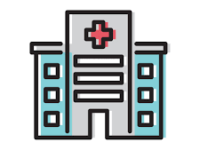In recent years, the production of weight loss drugs has exploded across the United States. Though these drugs have promising potential in combating the obesity epidemic in the United States, I worry these drugs will widen healthcare inequities for the very patients who need access to weight management care the most.
In clinical studies, injection-based weight loss medications, such as Ozempic and Wegovy, have resulted in roughly 10-15 pounds of weight loss after 12 months of treatment. The medications stimulate weight loss by mimicking the gut hormone glucagon-like peptide-1, or glp-1, to slow digestion rates and suppress hunger signals sent to the brain. As a result, patients on medications such as Ozempic and Wegovy have suppressed appetite and increased levels of satiety.
Weight loss has been proven to have life-changing health benefits, such as lowered risk of heart attack and type 2 diabetes. But between high costs and an increasing demand, weight loss medications have become inaccessible to many of the people who need them the most.
According to the Kaiser Family Foundation, weight management medications can cost upwards of $1,000 a month in the United States, nearly $750 more than in other nations. High costs have not only impacted out-of-pocket access to weight loss medications but also the willingness of insurance companies to provide coverage.
“Weight management medications can cost upwards of $1,000 a month in the United States, nearly $750 more than in other nations.”
Beginning in April, weight loss medications will no longer be covered by North Carolina state employees after weight loss prescriptions comprised over 10% of the state’s healthcare spending. The University of Texas and the Mayo Clinic have also implemented strict restrictions to their coverage of weight loss drugs, while other companies have limited their coverage to those whose weight places them above a certain body-mass index.
The refusal of insurance companies to provide aid is concerning for all patients, but especially for low-income individuals on Medicare. The Medicare Prescription Drug, Improvement, and Modernization Act of 2003 prohibits the coverage of weight loss medications under Medicare, excluding roughly 80 million Americans from access to preventative medications.
Denying access to prescription weight loss medications to low-income populations widens the gap in preventative healthcare among people of color, who have historically faced higher frequencies of obesity and poverty than white Americans.
“More than anything, the reluctance of insurers to cover weight loss medications highlights the social stigma associated with obesity.”
More than anything, the reluctance of insurers to cover weight loss medications highlights the social stigma associated with obesity. In a 2021 study from the University of Connecticut, researchers found that over two-thirds of overweight adults faced judgment from healthcare providers based on their weight, despite studies suggesting that inherent factors such as genetics and hormonal imbalances can play a role in obesity.
As the market for weight-loss medications grows, I can only hope insurance companies may come to see how crucial these medications could be in helping patients lose weight and maintain weight loss. Though the medications provide a hefty cost upfront, they could save thousands of dollars in medical care for both patients and insurers alike by preventing lifelong healthcare conditions associated with obesity.






